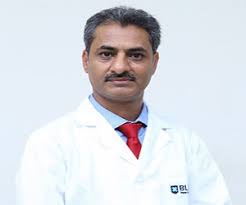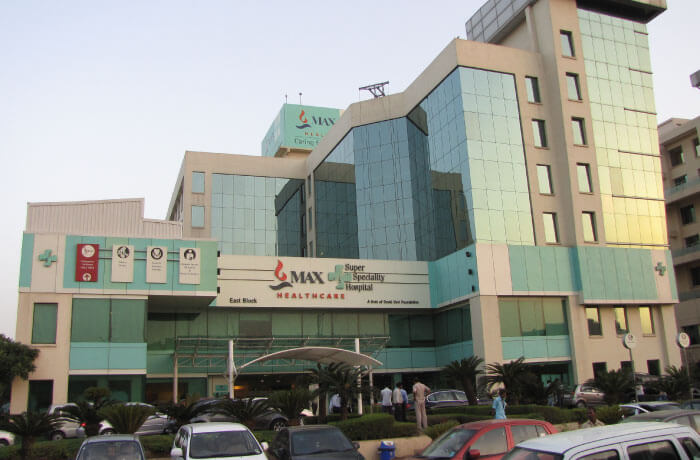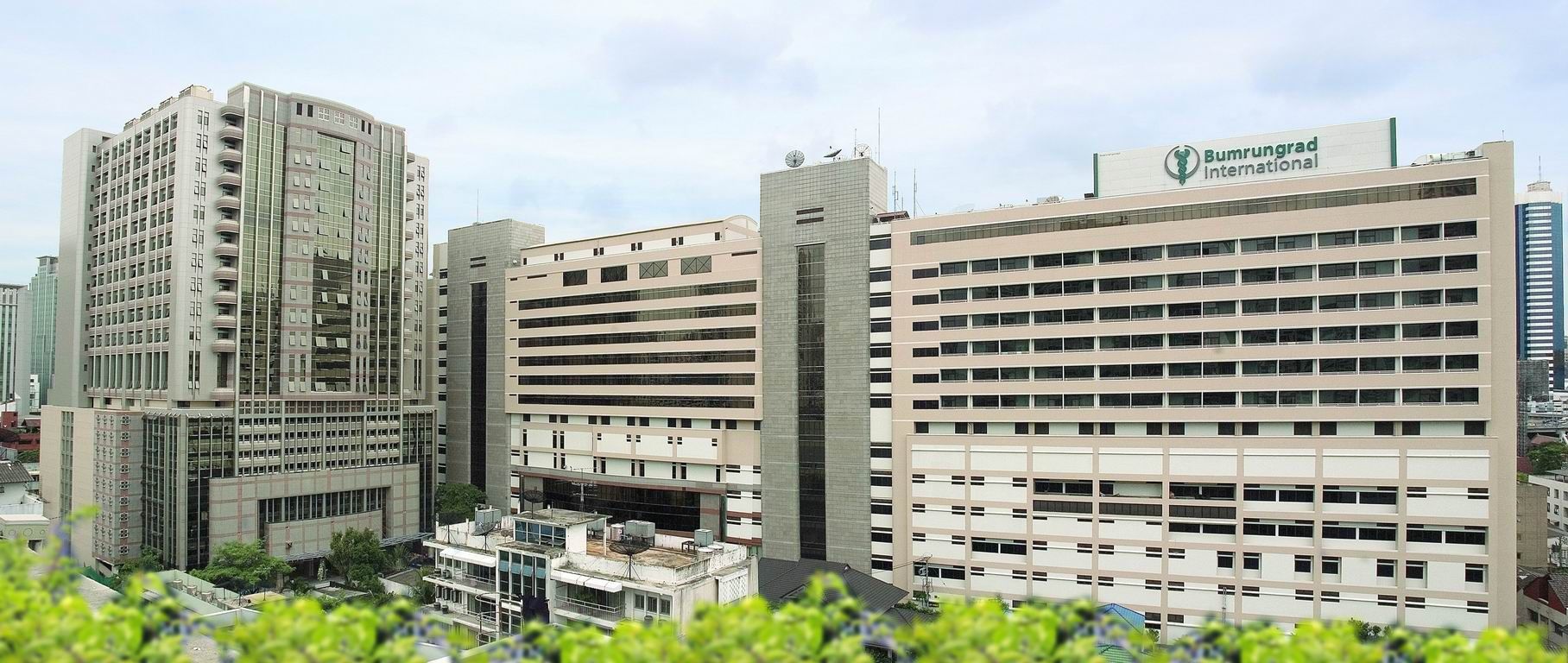Urology
Kidney Transplant Surgery
Renal Transplantation
Kidney transplant surgery is a procedure in which a new donor kidney is inserted in our body. Kidney diseases are treated through this procedure | GetWellGo
What is Kidney Transplant Surgery?
A kidney transplant Surgery is a surgical procedure to replace a non-functional or damaged kidney with a healthy one. It is one of the most common organ transplant surgeries performed today.
The kidneys are two bean-shaped organs, each located on either side of the spine below the rib cage. Each one is about the size of a closed fist. The main role of the kidneys is to filter waste products and purify the blood. If the kidneys are not able to perform this function, waste products can build up in the body, which could be life-threatening.
What Happens When Kidneys Fail?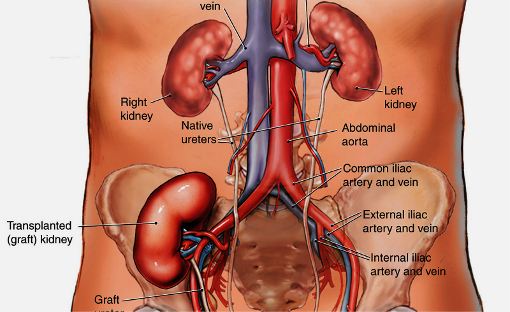
Harmful waste builds up in the body, which may lead to:
- High Blood Pressure
- Edema (Fluid build-up)
- Salts and Acids get out of balance
- Decreased RBCs
- Weak Bones
All of these can be harmful and/or deadly to the body.
Common causes of end-stage renal disease include:
- Diabetes
- Chronic, uncontrolled high blood pressure
- Polycystic kidney disease
People with kidney disease need to have waste removed from their blood via a machine (dialysis) or a kidney transplant to stay alive and have a functional body.
Who can have a kidney transplant Surgery?
Most people who need a kidney transplant can have one, as long as:
- they're well enough to bear the effects and side effects of surgery
- the transplant has a good rate of success
- the person is willing to comply and afford the recommended treatments required after the transplant
Kidney Transplant Surgery in India
About 30% of people with kidney failure can have a kidney transplant Surgery. This surgery replaces 2 failed kidneys with 1 healthy one. About two-thirds of kidney transplants come from non-living (deceased) donors. But family members (spouse and friends (living, unrelated donors)) can donate safely if tests show that the donor will have nearly normal kidney function after giving up 1 kidney.
A kidney transplant is usually placed in the lower belly without removing the failed or damaged kidneys. The artery and vein of the new kidney are joined to an artery and a vein in the pelvis just next to recipient’s bladder. The tube that drains urine from the kidney to the bladder (ureter) attached to the new kidney is joined to recipient’s bladder or to one of the recipient’s ureters. In a non-adult recipient, the blood vessels from a large adult kidney transplant are usually joined to the recipient’s aorta (the largest artery in the body) and inferior vena cava (the largest vein in the belly).
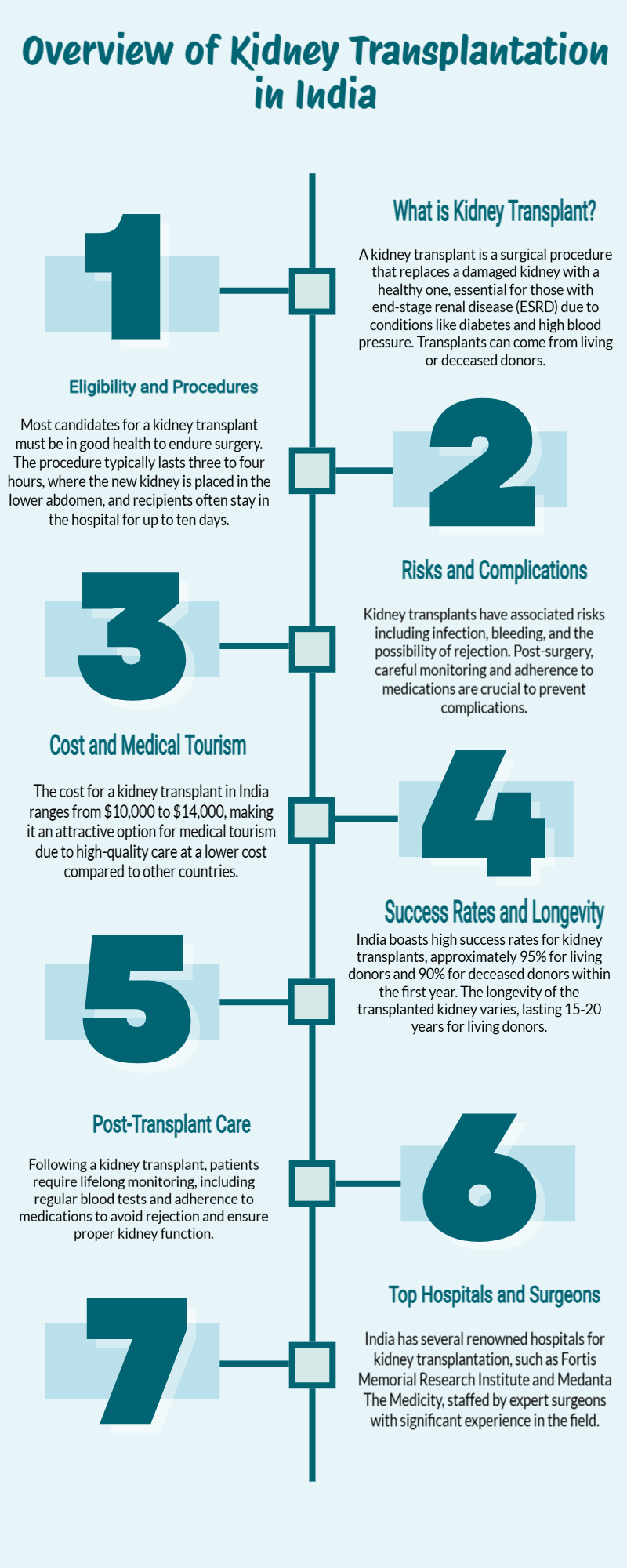
How long do kidney transplants last?
There are a number of factors on which life of a transplanted kidney depends. These include whether the kidney came from a living donor or not, how well the kidney is matched in terms of blood group and tissue type, and the age and overall health of the person receiving the donation (an also the health of donor if the transplant is Living-donor kidney transplant).
If you have a kidney transplant that fails, you can usually be put on the waiting list for another transplant and you may need dialysis in the meantime.
What are the Risks involved?
Kidney transplantation in India can treat advanced kidney disease and kidney failure, but it is not a cure or permanent treatment. Some forms of kidney disease may return after transplant, also there might be an infection in the kidneys.
The health risks associated with kidney transplant include those associated directly with the surgery, rejection of the donor organ and side effects of taking medications needed to prevent your body from rejecting the donated kidney.
Deciding whether a kidney transplant is right for the recipient is a personal decision that deserves careful thought and consideration of the serious risks and benefits associated with it. Talk through your decision and review with your friends, family, and other trusted advisors.
Complications of the procedure
Kidney transplant Surgery includes a risk of significant complications, which includes:
- Blood clotting
- Bleeding
- Leaking from or blockage of the ureter (that links the kidney to the bladder)
- Infection
- Failure of the donated kidney
- Rejection of the donated kidney
- An infection or cancer that can be transmitted with the donated kidney from a donor to recipient
- Death, heart attack and stroke
During the procedure
- Kidney transplants are performed with general anesthesia, so the recipient is not aware of the happenings during the procedure. The surgical team monitors the recipient’s heart rate, blood pressure and blood oxygen level throughout the procedure.
During the surgery:
- The surgeon makes an incision (a small opening) and places the new kidney from the donor in the recipient’s lower abdomen. Unless the recipient’s own kidneys are causing complications such as high blood pressure, stones in kidney, pain or infection, they are left in place.
- The blood vessels of the new kidney are attached to blood vessels in the lower part of the recipient’s abdomen, just above one of the recipient’s legs.
- The new kidney's ureter — the tube that links the bladder to the kidney— is connected to the recipient’s bladder. After the procedure
After your kidney transplant, the recipient can expect to:
- Spend several days (could be weeks or a month) in the hospital.
- Have frequent checkups as you continue recovering.
- Medications will be continued for the rest of your life.
Kidney Transplant in India
- The cost of Kidney Transplant Surgery in India Subcontinent ranges between 10,000 $ to 14000 $.
- The recipient has to stay approximately 10 days in the hospital and 30 days outside the hospital.
- Kidney donor and recipient should be relatives, as it is illegal in India to get a local donor.
- Medical tests to be done are blood tests, X-Ray, ECHO, ECG, Cardiac Stress Test, Compatibility Tests, Colonoscopy, Prostate Exam, and Cancer Screening.
Results
90% of the transplanted kidneys work well at the end of 1 year. About 4% of kidney transplants stop working each year after that. The new kidney is always at risk for rejection, so it is necessary to take all of your drugs as you are told by your doctor. A kidney from a living donor has a better chance of lasting than one from a non-living donor. The chance that kidney disease will come back in the transplant depends on the original cause of kidney failure and the donor.
Your kidneys filter waste products and surplus materials from your blood to create urine. The kidneys perform a number of essential tasks, including:
- Aids in the Filtration Process
- Controls Blood Pressure
- Aids in the production and development of red blood cells
- Maintains the body's pH balance
If you have end-stage renal disease, you might require a kidney transplant (ESRD)
Some conditions of the kidneys that may result in ESRD include:
- Repeated urinary infections
- Glomerulonephritis (inflammation of the kidneys' filtering units)
- High blood pressure or diabetes-related kidney failure
- Polycystic kidney disease or other inherited disorders
- Lupus and other diseases of the immune system
- Obstructions
Types of Kidney Transfer in India
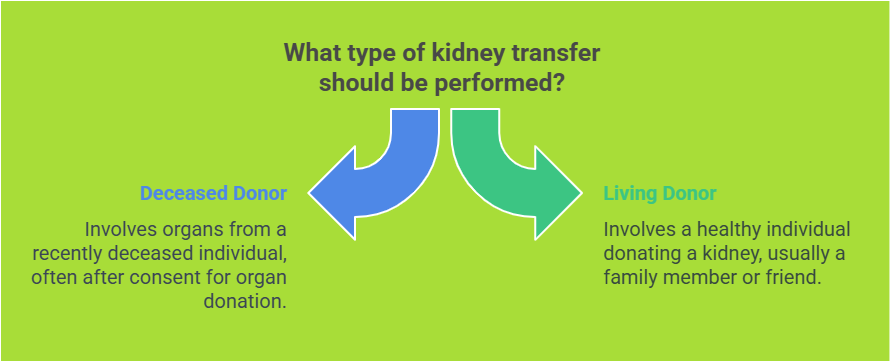
There are two different types of kidney transfer:
Deceased donor: The individual who recently died away without affecting the organs. The majority of organ donors are persons who make the decision to give their organs after passing away.
Living donor: In this process, the kidney from a healthy donor will be removed by the doctors and surgically inserted into the kidney failure patient. Here, the living donor may be a member of the immediate family, an acquaintance, a partner, or any other adult over the age of 18.
Why choose India for Kidney Transplant Surgery?
Because of its high-quality and reasonably priced healthcare services, India has become a popular destination for medical tourism, drawing patients from all over the world. It is important to know how much treatment would cost if you are thinking about getting a kidney transplant Surgery in India. In India, the price of a kidney transplant can differ according to the facility, the location, and the physician's charge.
The cost of a kidney transplant Surgery in India is a draw for people from other countries seeking lower medical costs. India provides patients with the best and most expensive medical services available at a reasonable cost.With our assistance, you may research the top kidney transplant hospitals in India and choose wisely for your medical needs.
What is the Kidney Transplant Waitlist in India?
In India, there is a significant gap between donor and the number of patients who need a kidney transplants. Every year 1.8 lakh patients develop end stage renal diseases and there are just 6,000 kidney transplants in the country. This has the effect of increasing the period that patients requiring a transplant have to spend waiting for donor’s organ. The main cause of the current situation is the lack of donors; only 4% of the necessary number of kidney transplant surgeries is conducted annually. Nevertheless, the number of individuals in need of kidney transplants goes on rising and the number of those willing, and capable of donating, kidneys remains limited, meaning that there are long waits for most patients.
How do I get on the transplant wait list in India?
It is a mixture of the blood type and the level of antibodies, the time needed to suffer from kidney failure, and few other features that make people higher on the list when it comes to kidneys. On average, it may take anywhere from three to five years depending on the place and in some regions of the country it may take much long. To get better understanding of the wait times, you should consult the transplant clinic.
What are the requirements to qualify for a kidney transplant?
To be considered for a transplant, you must meet certain criteria, which vary depending on the organ being transplanted.
The following are some of the factors that may make you a good candidate for a kidney transplant:
- If you're on dialysis because you have end-stage kidney disease.
- If you have stage IV or V chronic renal disease with a GFR less than 20 ml/min, you should see a doctor.
- If your GFR is less than 30 ml/min, you have stage IV chronic renal disease.
- If you have type 1 diabetes and chronic renal disease that hasn't responded to medical treatment.
Medical Visa Process
Step 1: Eligibility for Medical Visa
- A medical visa is also known as M visa, which is issued to the foreign patients visiting India for sharing medical treatment.
- It is possible to invite only two persons – relatives or other persons connected with the applicant in any other way – to accompany the applicant on the Medical Attendant Visa (MX visa).
- The patient should be in search of treatment in any accredited hospital in India.
Step 2: Gather Required Documents
You will need:
- Medical documents: A letter from the hospital of India stating that the medical condition of the patient has been treated and they have undergone through liver transplant.
- Client Medical History: Information on the liver disease: diagnosis report, treatment and doctor advice.
- Visa Application Form: Intended visa application form duly completed, which could only be downloaded from the website of Indian embassy in your country.
- Passport: Valid for at least six months with at least two blank pages.
- Evidences of the ability to meet the medical costs: Banks statements or a sponsorship letter.
- Proof of Residence: National ID, utility bills, or similar documents.
- Treatment Plan & Organ Transplant Approval: The Indian hospital’s approval for the transplant.
If the organ donor is accompanying the patient, then he or she also requires permission according to the Indian laws on organ donation.
Step 3: Apply for the Medical Visa
- This can be done by going directly to the official website of the Indian embassy or the Indian consulate in the country of your residence.
- The e-Medical Visa or Regular Medical Visa application form has to be completed.
- In case if the visa fee is applicable then the candidate will have to pay this fees online.
- Send the application with necessary documents to the nearest Indian consulate or the visa centre where such facilities are offered.
Step 4: Wait for Processing & Approval
- Delivery time is 3-7 working days and may vary depending on the country.
- If granted, the visa gets stamped on the passport to show that the holder is entitled to enter the country of destination.
Step 5: Travel to India & Report to the Hospital
- When going for medical purposes, clients should ensure to carry all their medical documents and a copy of their visa.
- Register with the local Foreigner Regional Registration Office (FRRO) if necessary within 14 days from the arrival in India.
- Continue with medical assessment of the hospital and its transplants.
Kidney Transplant Surgery Procedure in India
- A kidney transplant Surgery is a medical treatment carried out by specialists or surgeons with extraordinary training and experience in this area.
- A number of tests are conducted prior to the transplant surgery to assess the degree to which the kidney of the donor fits the recipient's tissue type and blood type.
- The operation is a more involved process that could take three to four hours. Kidney transplantation is done under general anesthesia.
- During the surgery, a lower abdominal incision is made to allow the surgeon to access the diseased kidney.
- The kidney from the donor is then transplanted. The external iliac artery and vein are stitched to the renal artery and vein of the kidney donor.
- The recipient's bladder is now attached to the donor's ureter.
- In order to prevent infection, the surgeon then used sutures to close all of the incisions and covered them with sterile dressings.
Latest Innovation in Kidney Replacement Therapy in India
Transplantation procedures have advanced remarkably in recent years. These developments have expanded the pool of potential donors, allowing recipients of a life-saving kidney transplant who have distinct tissue types (HLA incompatible) or incompatible blood types (ABO incompatible).
ABO Incompatible Kidney Transplant:
-
Patients can now receive a kidney from a donor who has a different blood type. The immune system's rejection response made it impossible in the past.
-
By reducing antibodies and preventing rejection, this novel treatment enables patients to find a living donor—a family member or friend—who may not share their blood type and receive a transplant that could save their lives.
HLA Incompatible Kidney Transplant:
- In the past, a successful transplant required a perfect match between the donor and the recipient.
- Even though the kidney isn't a perfect match, patients can still receive one because of modern treatments.
- Specialized care is required for kidney transplants that are HLA incompatible in order to reduce the chance of rejection.
- This approach has made it possible for recipients to receive a kidney from a living donor, even if they are not a perfect match.
Precautions after Kidney Transplant Operation in India
If appropriate care is not given, the kidney transplant procedure is exceedingly risky and complex. Following a successful transplant, one should adhere to the following advice:.
- Stay in the hospital for at least one week to receive the necessary attention and recuperate under the supervision of knowledgeable medical professionals.
- It is recommended to undergo a blood test multiple times a week and to modify medicine as directed by the physician.
- Drinking enough water is really important.
- A nutritious diet is essential for a quicker recovery. Therefore, be careful to adhere to dietary limitations.
- Make sure you monitor your blood sugar levels because anti-rejection medications can raise them.
- Finally, physical activity is crucial for a speedier and healthier recovery.
Success rate after Kidney Transplant Surgery in India
The reasons for kidney failure, the patient's age, the medical team's experience, the quality of the donated organ, and other factors all affect the success rate of kidney transplants. However, if the statistics are to be trusted, India has an extremely high kidney transplant success rate—roughly 95%. According to reports, kidney transplant success rates are higher in India than anywhere else in the globe.
How many successful surgeries of kidney transplants are done in the last year?
In India, 13,642 kidney transplants were performed in 2023, with 11,791 from living donors and 1,851 from deceased donors.
Best hospitals for kidney transplant Surgery in India
India has become the world's leading destination for kidney transplants, so it's not difficult to find the best kidney transplant hospitals in the country. However, for your convenience, the list of the best and most well-known hospitals for surgery is provided below:
- Fortis Memorial Research Institute - Gurugram
- Medanta The Medicity - Gurugram
- Artemis Hospital - Gurugram
- Max Hospital - Delhi
- Apollo Hospital - Delhi
Best surgeons offering kidney transplant Surgery in India
Surgery for kidney transplantation is a complex procedure. This is why a successful treatment and full recovery depend greatly on the surgeon's experience. You may learn more about the top kidney transplant surgeons in India by looking through the list.
- Dr. Anil Mandhani
- Dr. Rajesh Ahlawat
- Dr. Varun Mittal
- Dr. Dinesh Khullar
- Dr. S N Mehta
Why choose GetWellGo for Kidney Transplant in India?
GetWellGo is regarded as a leading supplier of healthcare services. We help our foreign clients choose the best treatment locations that suit their needs both financially and medically.
We offer:
- Complete transparency
- Fair costs.
- 24 hour availability.
- Medical E-visas
- Online consultation from recognized Indian experts.
- Assistance in selecting India's top hospitals for kidney transplant.
- Expert physicians with a strong track record of success
- Assistance during and after the course of treatment.
How can I apply for, obtain, or schedule a kidney transplant in India?
We can assist you in finding the top kidney transplant hospital in India. Check us out at getwellgo.com, our official website. To schedule an appointment for kidney transplant in India,contact us via phone at +91-9289678787 or email us at care@getwellgo.com
Case Study of our Patients Treated for Kidney Transplant in India
Kidney Transplant Surgery for a Kenyan Patient at BLK-Max Hospital, New Delhi
- Patient Name: Mr. Joseph Githara Kamau
- Age: 45 years old
- Gender: Male
- Country of Origin: Kenya
- Doctor Names: Dr. Ashwini Goel, Dr. H. S. Bhatyal, Dr. Ankur Arya
- Hospital Name: BLK - Max Super Speciality Hospital, Delhi
- Treatment: Kidney Transplant
This is one of the real life incidences of a patient Mr. Joseph Githara Kamau from Kenya who was affected by a serious case of complications of the kidneys. He had a kidney transplant in 2015 but his received kidney failed to perform optimally hence having to go for another transplant. Despite it all, he set out to seek for the best medical help that he required, and turned to the GetWellGo program as the best remedy.
In India, the International patient services department of GetWellGo had arranged his airport transport, accommodation, medical appointments and all other requirements right from his need for a medical treatment. His sister kindly volunteered to be the donor and under the operation of the proficient Dr. Ashwini Goel, Dr. H.S. Bhatyal as well as Dr. Ankur Arya of BLK – Max Super Speciality Hospital, Mr. Kamau was fortunate to have a second kidney transplant.
If there were any modifications of the sizes or other complications following the surgery he was observed for signs of such changes and treatment given accordingly. Because of the maxillofacial prosthesis, his general health status gradually stabilized over the next few weeks and the new kidney functions properly.
For his part, Mr. Kamau was happy to express his gratitude to the donors and said:
The kind of care I received at BLK – Max Super Speciality Hospital is above all the other hospitals that I have been admitted to in the past. All, starting from the doctors through the coordinators, made sure that I was relaxed at every stage. In this, I find these very words suitable since the personnel have shown so much care and concern to me.
This is why, for the day, we join the family in rejoicing the regaining of Mr. Kamau by wishing him well in the future and good health.
Kidney Transplant Surgery for a Nigerian Patient
- Patient Name: Mrs. Luko
- Age: 60 years old
- Gender: Female
- Country of Origin: Nigeria
- Doctor Name: Dr. Sandeep Harkar
- Hospital Name: Artemis Hospital, Gurgaon
- Treatment: Kidney Transplant
The case is a 60-years old Nigerian woman – Mrs. Luko who was experiencing rapidly progressing kidney disease that dramatically alters her life. And when the situation grew worse, it was quite clear that the only option was a kidney transplant. She decided to go for another online platform known as GetWellGo to complete her treatment in India after consulting with her relatives and a thorough research.
The international patient services department of GetWellGo came to pick her from the airport, identified a suitable accommodation for her, and well co-coordinated her ap
TREATMENT-RELATED QUESTIONS
GetWellGo will provide you end-to-end guidance and assistance and that will include finding relevant and the best doctors for you in India.
A relationship manager from GetWellGo will be assigned to you who will prepare your case, share with multiple doctors and hospitals and get back to you with a treatment plan, cost of treatment and other useful information. The relationship manager will take care of all details related to your visit and successful return & recovery.
Yes, if you wish GetWellGo can assist you in getting your appointments fixed with multiple doctors and hospitals, which will assist you in getting the second opinion and will help you in cost comparison as well.
Yes, our professional medical team will help you in getting the estimated cost for the treatment. The cost as you may be aware depends on the medical condition, the choice of treatment, the type of room opted for etc. All your medical history and essential treatment details would be analyzed by the team of experts in the hospitals. They will also provide you with the various types of rooms/accommodation packages available and you have to make the selection. Charges are likely to vary by the type of room you take.
You have to check with your health insurance provider for the details.
The price that you get from GetWellGo is directly from the hospital, it is also discounted and lowest possible in most cases. We help you in getting the best price possible.
No, we don't charge patients for any service or convenience fee. All healthcare services GetWellGo provide are free of cost.
Top Doctors for Urology
Top Hospitals for Urology
Contact Us Now!
Fill the form below to get in touch with our experts.

